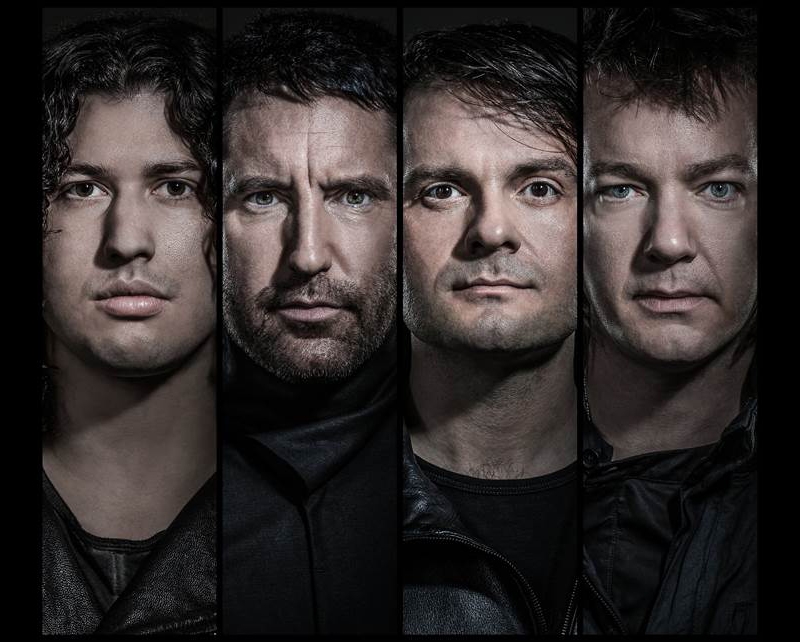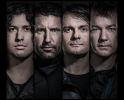National Music Reviews
Nine Inch Nails might be better known for their work in the ’90s, but their new material is just as good, if not better.
I love the band Nine Inch Nails. Is it rare to wholeheartedly devote yourself to everything a group (and, mostly, a single artist) puts out when you didn’t hear the music until your early 20s? This isn’t the stuff that got me through—and fostered—teenage angst. Yet, my early 20s were a time of reflection and a re-introduction to the world after living as that thing that many young Utahns become for two years. Yes, a Mormon missionary, which is a good way to escape problems such as bills, relationships with the sex you are attracted to (well … you know, maybe) and living in the real world. Unless you work as a salesperson—then this is the perfect time to hone your craft.
I have never met anyone who possesses my obsession for NIN. Sure, people love some tracks off Pretty Hate Machine through The Fragile, but I have barely conversed about the oeuvre after this period with anyone (close friends and music journalists don’t count). I never see people get excited about 2004 to present Trent Reznor news (theninhotline.com seems to be out of business), but maybe I’m in the wrong circles. That leads me to my conclusion—I probably wouldn’t get along with Nine Inch Nails fanatics. I think we’re a bunch of closeted, ashamed people who don’t care to discuss our fascination with this brand of Pop. Based on a few concerts I attended over the last 10 years, NIN fans like to punch girls in the head and reflect on their tans. The Situation is probably into Nine Inch Nails, but I digress.)
Starting with With Teeth in 2004, Trent has been incredibly prolific, putting out five full (and double-disc) albums, winning Oscars with his million-hour long soundtracks, produced an incredible Saul Williams album—all on top of being a parent of two little kids (and greyhounds). It may be the lack of exposure from MTV and radio play (or a suitable station that will embrace his early stuff as “Classic Rock”), but I find that most of my friends who say “oh yeah, I love Pretty Hate Machine” were totally over NIN before this sober, second wind. And you’re all missing out because 1) sonically, the music is an immaculate mix of odd sounds and astounding production value 2) the lyrics are still Reznor, but not in a “I’m old Morrissey, and I’m going to sing about being a sad kid,” way. NIN shows are some of the last epic experiences from the “Alternative” era—the dude is 50 and he’s still jumping around, cursing and innovating with his stage setup.
So here is some of the stuff you need to investigate—things that, when they came out, gave me the same excitement I felt when I first heard “Suck” in 1991:
“All the Love in the World” (With Teeth 2004): The first new bit of NIN music for several years, this one started off as “um, where is he going with this?” But watch this grow from clever little drum bits and pushing bass to a full-on synthetic Gospel. Most of the rest of the album is heavier—that’s what happens when you have Dave Grohl play on your record.
“Beside You in Time” (With Teeth 2004): It’s an outside the NIN (fan) comfort zone song with a hypnotic, hyper-compressed polyrhythmic pulse and carefully controlled drone. Of course it bursts into a decent amount of distorted guitar, and we all are left thinking “and on / and on / this goes on / and on.” Hum-worthy.
“God Given” (Year Zero 2007): My second favorite NIN album (right after The Fragile), Year Zero is a concept album with a “we’re 10 years in the future, and it sucks” message. Everything is pretty bleak, and all the people you didn’t want to win did, people are microchipped, there is an underground movement like in the last few seasons of Fringe. Trent loves to sing about religion, and this is an interesting mirror of Terrible Lie where “screw you, God” is replaced by “I’m going to be eloquent about what happens when religion rules the world.” Listen to that 808 cowbell and vocal processing on the chorus – listen to it!
“Me, I’m Not” (Year Zero 2007): Intentionally or not, the rhythm sounds like a rip-off of Depeche Mode’s “Home.” Is that a bad thing? I don’t think so. Lean into that groove. Here is the amazing Kraftwerk stage version.
“The Great Destroyer” (Year Zero 2007): It’s all about that bass (drum). We’re going along with a story probably about George W. Bush. Little synth noises are wiggling around with slinky guitars. You didn’t see what happens at 1:40 coming. The first time I heard the next bit, I nearly had to pull over because it’s a damned baller display of glitching and explosions. You have to turn this one up—a lot. Watch the outro live here (it was so effing amazing to witness firsthand).
“1,000,000” (The Slip 2008): I once described this as The Stooges—I know, blasphemy!—with less nudity and more modular synth breakdowns. This live version is a bit more rock n’ roll than the original, but man is it cool and electric when everyone flips out in the middle of the second chorus. Robin Finck is a guitar god (notice him making this simple riff interesting by only using upstrokes).
“Head Down” (The Slip 2008): Same thing goes here about Robin Finck. The song is Sabbath licks, cool echoing vocals, shouts, shy piano and a wild synth outro. Robin … mofo … Finck. And Justin Meldal-Johnsen (on bass here) is such a killer, versatile player (see all Beck albums, Tori Amos and a million other records for his CV).
Ghosts I-IV (2008): A double album of instrumental stuff featuring Adrian Belew on guitar and Brian Viglione (Dresden Dolls) on a crazy, homemade drum kit of buckets and trash cans, the record runs the gamut of doomy destruction and innocent piano, quasi-Gamelan. When my boo and I saw NIN live, the band played several of these as a suite. The result was this: the crowd got noisy and irritated. My boo said, “Hey, maybe I like Nine Inch Nails!”
“Copy of A” (Hesitation Marks 2013): Hesitation Marks wasn’t supposed to happen, as Reznor retired the band. So he is the Michael Jordan of music, and lucky for us. Lindsey Buckingham on guitar (did you see the stunted Grammy performance?) and the incredible Pino Palladino on bass. People say this is “back to Trent’s roots,” but that’s a bullshit response by those who—you know—have no idea about his aesthetic (whatever that may be). Here is a live version where the instruments are added as the song progresses—I told you they’re still awesome performers worth the stadium prices. Sorry he’s a little flat at the beginning, but this is the most bombastic version from this tour I could find. Those lights! And I want that drum setup.
“Everything” (Hesitation Marks 2013): Oh man does this start off like every post-emo song (i.e. AFI). It’s so, so, so poppy, but those choruses are a whirlwind of scariness, and the production is treated just enough to make a spicy song (i.e. unexpected, cool noises). And I’m pretty sure whoever played the guitar solo laid it down and said, “Crap, I just almost played ‘Just Like Heaven.’” There is something about this track that makes me want to scream along.
“Running” (Hesitation Marks 2013): Another great minimalist example from Hesitation Marks where drum machine and dry production pull the listener into an intimate relationship of finger-tapping, head-nodding and sassy guitar. And another notch in Reznor’s, “Hey, I played everything here,” belt.

